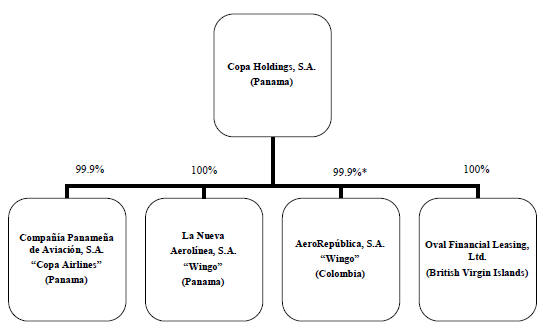Currently, we do not have purchase options under any of our operating lease agreements. Under our operating lease agreements, we are required to make supplemental rent payments at the end of the lease that are calculated with reference to the aircraft’s maintenance schedule. In either case, we must return the aircraft in the agreed-upon condition at the end of the lease term. Title to the aircraft remains with the lessor. We are responsible for the maintenance, servicing, insurance, repair and overhaul of the aircraft during the term of the lease.
To better serve our business travelers, we offer a business class (
) configuration in our fleet. Our business class service features upgraded meal service, special
check-in
desks, bonus mileage for full-fare business class passengers and access to VIP lounges. Our Boeing
737-800
aircraft currently have two different configurations, one with 16 business class seats with
38-inch
pitch; and a second, with
48-inch
pitch seats, which is currently being used in 36 of our
737-800s.
In order to accommodate these seats, a row from economy class was removed, decreasing the total number of seats in those aircraft from 160 to 154. The Boeing 737 MAX 9 aircraft feature two configurations: one with 16 full
lie-flat
seats in business class (Dreams) and a total of 166 seats and another configuration with 12 full
lie-flat
seats in business class (Dreams) and a total of 174 seats.
Also, within the Copa Holdings fleet, there are eight
737-800s
dedicated to the operations of Wingo. These aircraft are equipped with 186 economy class seats.
Each of our Boeing
737-Next
Generation aircraft is powered by two CFM International Model CFM
56-7B
engines. Our Boeing 737 MAX 9 aircraft are powered by two CFM International Leap 1B engines. We currently have nine spare engines for service replacements and for periodic rotation through our fleet.
The maintenance performed on our aircraft can be divided into two general categories: line and heavy maintenance. Line maintenance consists of routine, scheduled maintenance checks on our aircraft, including
pre-flight,
service visits,
“A-checks”
and any diagnostics and routine repairs. Copa’s line maintenance is performed by Copa’s own technicians at our main base in Panama and/or at the out stations by Copa Airlines and/or AeroRepública employees or third-party contractors. Heavy maintenance consists of more complex inspections and overhauls, including
“C-checks,”
and servicing of the aircraft that cannot be accomplished during an overnight visit. Maintenance checks are performed intermittently as determined by the aircraft manufacturer through Copa Airlines AAC approved maintenance program. These checks are based on the number of hours, departures or calendar months flown. Historically we had contracted with certified outside maintenance providers, such as COOPESA. In October of 2010, Copa decided to begin performing a portion of the heavy maintenance work
in-house.
The hiring, training, facility and tooling setup, as well as enhancing certain support shops, were completed during a
ten-month
period. Ultimately, Copa acquired the required certifications by the local authorities to perform the first
in-house
C-Check
in August 2011, followed by its second
C-check
in October of the same year. Today we are performing a continuous line of
C-Checks
in-house
for the entire year, and on January 20, 2017 we held the ground-breaking of our new maintenance facility at Tocumen International Airport which allows us to perform up to three complete continuous lines of
C-checks,
as required. The new facility commenced operations in January 2019. In 2021, 22 heavy maintenance checks were successfully performed
in-house.
When possible, Copa attempts to schedule heavy maintenance during its lower-demand seasons in order to maximize productive use of its aircraft. Additionally, as of the December 31, 2021, three of our Boeing
737-700/800
are still in CAVU Aerospace at Roswell International Air Center in New Mexico for storage due to the
COVID-19
pandemic impact on the economies we serve and our operations.
Copa has exclusive long-term contracts with GE Engines whereby they perform maintenance on all of our
CFM-56
engines.
In October of 2014, Copa Airlines established its own maintenance technician training academy. Through this program, we recruit and train technicians through
training and formal classes. These future technicians stay in the program for four years total. After the first two years, each trainee receives their airframe license and becomes a mechanic. After the next two years, each trainee receives their power plant license and is released as a mechanic into our work force.
Copa Airlines and AeroRepública employ, system-wide, around 477 maintenance professionals, who perform maintenance in accordance with maintenance programs that are established by the manufacturers and approved and certified by international aviation authorities. Every mechanic is trained in factory procedures and goes through our own rigorous
in-house
training program. Every mechanic is licensed by the AAC and approximately 24 of our mechanics are also licensed by the FAA. Our safety and maintenance procedures are reviewed and periodically audited by the AAC (Panama), UAEAC (Colombia), the FAA (United States), IATA (IOSA) and, to a lesser extent, every foreign country to which we fly. Copa Airlines’ maintenance facility at Tocumen International Airport has been certified by the FAA as an approved repair station, under FAR Part 145, and once a year the FAA inspects this facility to validate and renew the certification. Copa’s aircraft are initially covered by warranties that have a term of four years, resulting in lower maintenance expenses during the period of coverage. All of Copa Airlines’ and AeroRepública’s mechanics are trained to perform line maintenance on each of the Boeing
737-Next
Generation and Boeing 737 MAX.
